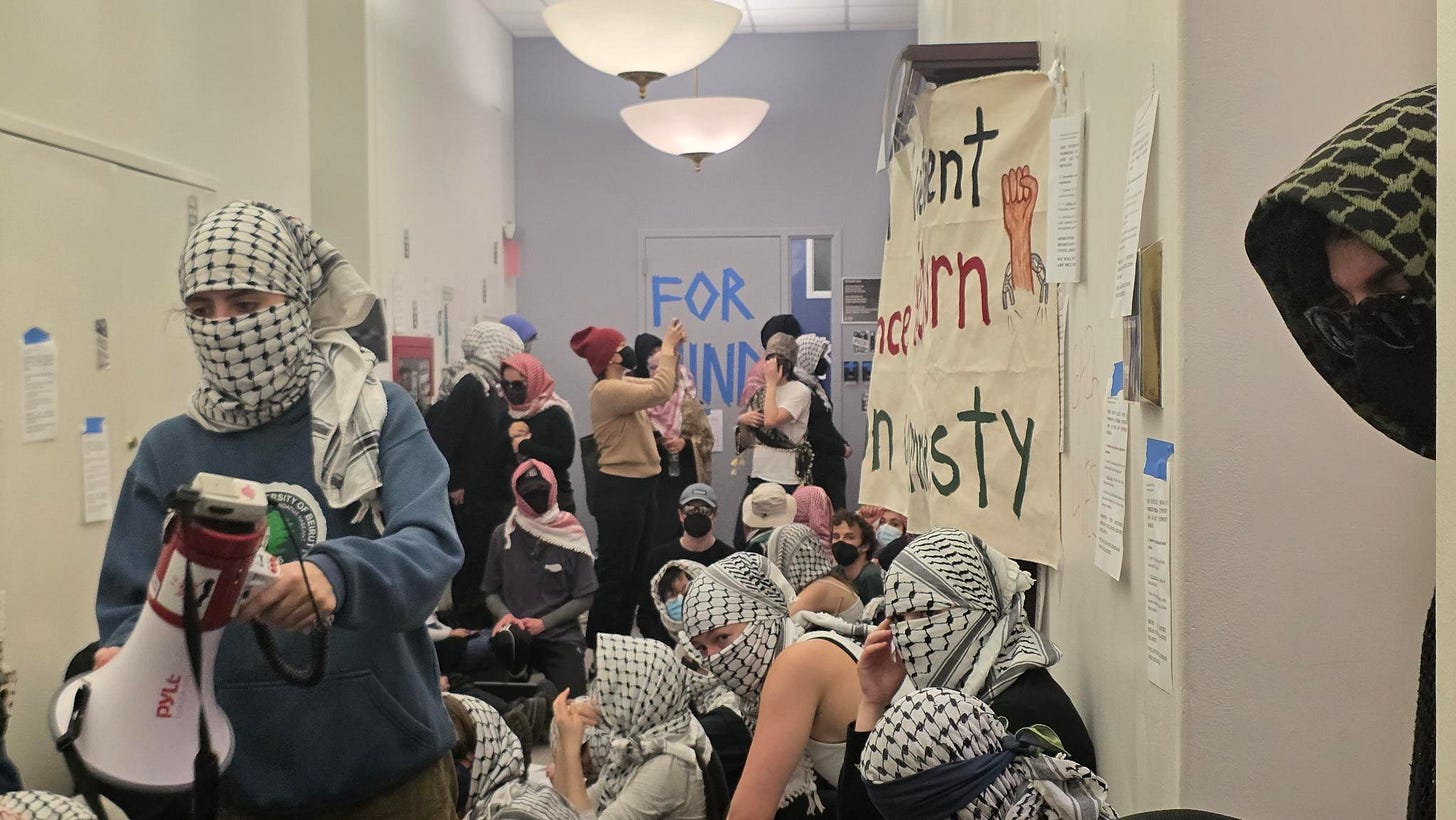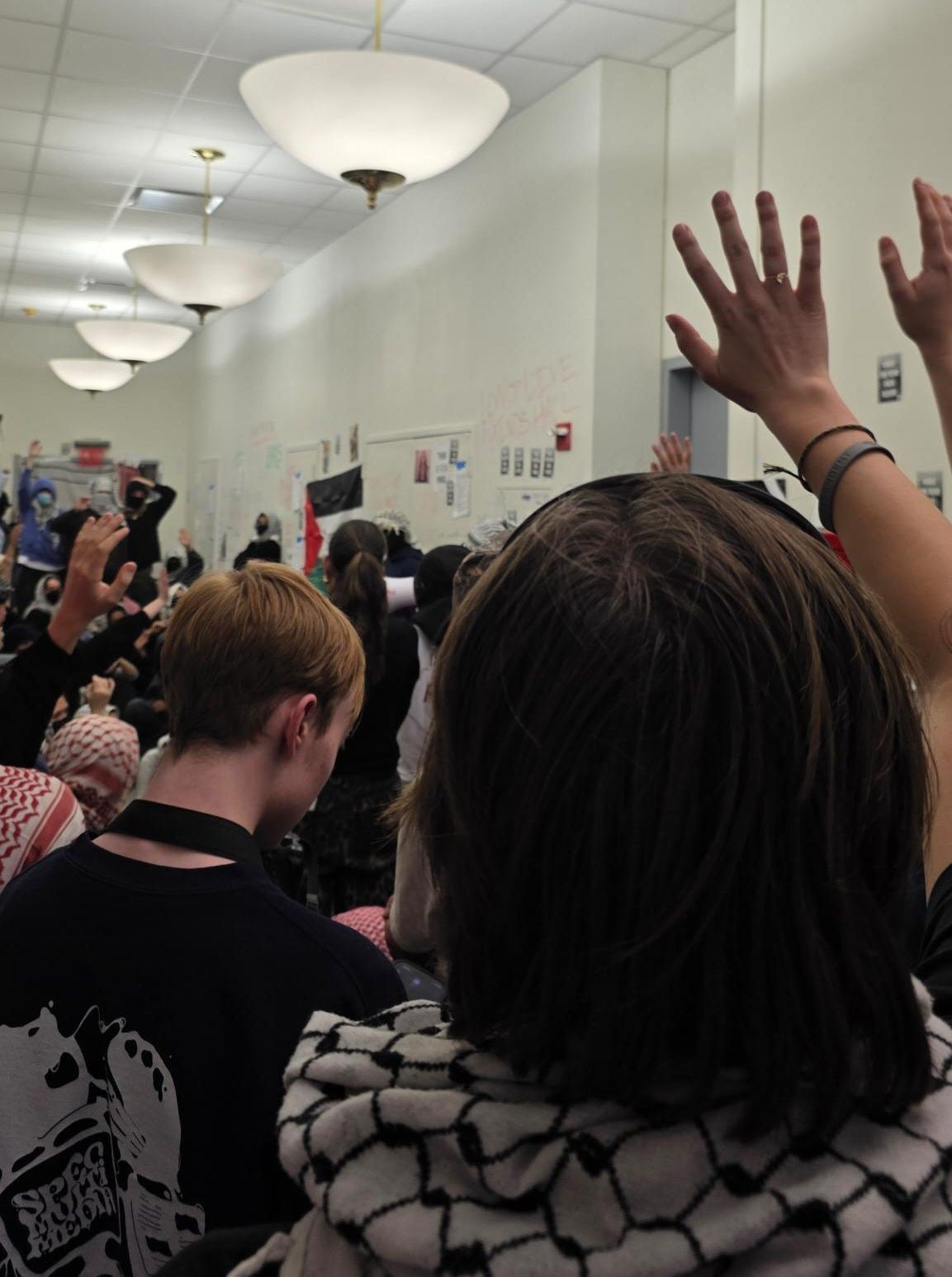Palestine activism has been smothered on college campuses but it is far from erased as Barnard College learned this week.
As the work day was coming to a close on Wednesday, The Indypendent’s Eric Santomauro-Stenzel reports, “Around 50 keffiyeh-clad protesters with Columbia University Apartheid Divest (CUAD) gathered at the 120th Street entrance, and made a mad dash into the building … ‘Free, free Palestine!’ the protesters chanted, running up a set of stairs. The activists turned right and quickly filled either side of a hallway as its startled occupants left. At the end of the hallway stood the office door of the subject of their ire: Barnard College Dean Leslie Grinage.”
To see the full story, scroll further down.
If you enjoy reading this story, please consider donating to The Indypendent today. It’s the support of readers like you that make journalism like this possible — fiercely independent journalism we need now more than ever in a time of rising authoritarianism not only in the White House but throughout society. You can contribute via PayPal, Patreon, or by becoming a paid subscriber to our Substack.

Inside the Student Sit-in That Rocked Barnard College
By Eric Santomauro-Stenzel
It was a quiet Wednesday at Milbank Hall. Barnard College students were attending classes and administrators working in offices. As the work day was coming to a close around 4 p.m., that all changed in less than a minute.
Around 50 keffiyeh-clad protesters with Columbia University Apartheid Divest (CUAD) gathered at the 120th Street entrance to Barnard and made a mad dash into the building. They stormed past at least two security guards posted there, pushing them out of the way. The university and the security guards’ union would later allege one of the guards was assaulted and hospitalized with minor injuries.
“Free, free Palestine!” the protesters chanted, running up a set of stairs. The activists turned right and quickly filled either side of a hallway as its startled occupants left. At the end of the hallway stood the office door of the subject of their ire: Barnard College Dean Leslie Grinage.
The door soon bore blue masking tape to say “For Hind,” with photos of the six-year-old Palestinian girl, Hind Rajab, who was murdered by the Israeli military last year. Protesters raised Palestinian flags on the walls, hanging above their heads as they sat on either side of the hallway.
Protesters demanded the reinstatement of two Barnard students they say were expelled for disrupting a “History of Modern Israel” class earlier this semester. CUAD called for the abolition of “the corrupt Barnard disciplinary process” and “amnesty for all students disciplined for pro-Palestine action or thought.” The group demanded a public meeting with Dean Leslie Grinage and President Laura Rosenbury.
The mix of Barnard and Columbia students and local community members would sit-in for nearly seven hours Wednesday night, negotiating with the administration and amongst themselves in a democratic process. Via faculty mediators at the sit-in, Barnard committed to a 1 p.m. Thursday meeting between senior Barnard leaders and movement representatives. The protesters, under implied threat of force, voted to leave the building. But Barnard reneged on its agreement, adding a new condition of no masks shortly before the meeting would have begun, according to a CUAD Instagram post.
A spokesperson for Barnard, Robin Levine, emphasized that “no promises of amnesty were made, and no concessions were negotiated” in Thursday comments to the Columbia Daily Spectator.
Barnard, the undergraduate women’s college affiliate of Columbia University, has taken a particularly aggressive approach against the student movement for Palestine since protests began last school year. Last spring, under Rosenbury and Grinage, Barnard put over 50 students on interim suspension for their participation in the Gaza solidarity encampment and gave them just 15 minutes to pack their rooms. This past fall, the school’s administration unilaterally created policies limiting free expression and protest.
Shortly after students occupied the hallway, Barnard security began to block building access. Asked by The Indypendent specifically if press were allowed in, one guard at the 120th Street entrance shook his head no. Another at a Milbank entrance inside Barnard’s gates said no “more” press would be allowed in. (The Indy still found a way in.)
CUAD, on the other hand, repeatedly emphasized that there was freedom of movement, and permitted several individuals unaffiliated with the protest to pass through the hall. “Have a good night, sir,” one demonstrator said to a janitor while clearing a path.
The next several hours would be marked by an increasing quantity of posters and graffiti on the walls—and a strengthening ambient body odor in the hot, tightly packed hallway. One protester joked to another, “We went and liberated this fan.”
The adjacent hallway became a de facto press area for the handful of student journalists able to enter the building. At one point, it also became a Muslim prayer room for several protesters and a Barnard security guard, who prayed together.
The hours were also marked by several unanimous votes to stay for another hour and the negotiations that ensued. Over the course of the evening, three Barnard faculty members moved in and out of the office, transmitting each party’s message or offer.
Professor Kristina Milnor opened negotiations by conveying Grinage’s message that President Rosenbury was in Florida, but that Grinage would still meet with Barnard students. However, much to demonstrators’ audible chagrin, she had conditions: only three students, only Barnard, no mask, a public safety officer and “witness” present, and none of the legal observers who’d arrived could attend. No recordings could be shared in the media.

For much of the night, CUAD members debated counter-proposals and how to proceed. With a few protesters facilitating via megaphone, the group discussed options as a collective assembly and held votes in small groups. Several times the students asked faculty mediators for a few more minutes. Dean Grinage’s offers evolved over the night, and the fight over visibility—both of protesters’ identities and record of Grinage’s potential comments to hold her accountable—became central to the next rounds of negotiation.
Participants were not promised amnesty for their actions, and facing a mini security state where students are regularly tracked, most were hesitant about what would come if they revealed their identities. At least one Barnard security guard used his phone to record students during the sit-in (and also blocked access to the bathroom).
When faculty and administrators came out to ask CUAD if Dean Grinage and some of them could go to the bathroom, one protester replied, “Yeah, but we’re gonna boo her while she does it.”
“Shame!” they shouted as she exited the office.
Both sides grew more impatient each time an offer was rejected or forestalled. Grinage’s communiqués became more urgent, with the clear goal of getting CUAD to leave as soon as possible.
With the NYPD gathering outside the building as the night dragged on, memories of last spring’s sweeps loomed large. When the NYPD cleared occupiers out of “Hind’s Hall”, a part of the April Columbia-Barnard Gaza solidarity encampment, they arrested over 100 students. Some arrests were violent; one student was thrown down a set of stairs.
During Wednesday’s sit-in, the Barnard administration, whether intentionally or not, sowed confusion among the protesters about potential law enforcement actions.
At 9:04 p.m., Columbia Daily Spectator reported that Barnard spokesperson Robin Levine issued a statement that the school would be “forced to consider additional, necessary measures” if the protest continued past 9:30 p.m. But nobody came out of the dean’s office to announce this vague deadline.
After word spread about the Spectator’s report, a protester asked the faculty mediators about it less than ten minutes before 9:30 p.m. The faculty hadn’t heard of this deadline, and they went to ask Grinage.
Would the NYPD be coming onto campus in, at that point, four minutes? “She doesn’t know,” Professor Nara Milanich said. She and another professor said Grinage claimed not to be in contact with the NYPD.
While 9:30 p.m. came and went, Grinage’s urging to pick a proposal grew. The proposals on the table for how to conduct a meeting included disciplinary amnesty for that day’s sit-in so long as the group left the building five minutes after the conclusion of any meeting. The faculty began to cajole CUAD to speed up the process, to some resistance.
By around 10:15 p.m., the group had finally agreed to send in three Barnard students to meet with Dean Grinage and was sorting out final details. But the faculty said time was running out.
“It was conveyed to us,” the third professor said, “that if it doesn’t happen right now, the deal might be off.”

A few minutes later, it was. “This ship has sailed for tonight,” a security staff member said, bursting out of the office at 10:30 p.m. “You’re gonna have five minutes to exit the building, okay?”
A Spectator reporter did a sign of the cross.
“We’re ready!” someone shouted.
After a few more minutes of frantic back-and-forth, faculty said Grinage and President Rosenbury were prepared to meet with three Barnard students, who may or may not have been present at the sit-in, the following day at 1 p.m. Faculty would meet and escort the students to an undisclosed location. The group decided to go with that option. By a 22–18 vote, CUAD exited the building. Tailed by the NYPD, media that had accumulated outside the building, and pro-Israel individuals, CUAD dispersed into Riverside Park.
On Thursday, CUAD was joined by the pro-Palestine group Within Our Lifetime at the Barnard gates. The NYPD swarmed the area and limited press access, and pro-Israel agitators attempted to record demonstrators’ faces close-up.
A CUAD member inside the campus gates announced that shortly before the meeting was scheduled to begin, a faculty mediator informed them that President Rosenbury and Dean Grinage had added the condition that students be unmasked for the meeting. CUAD members decided not to go along with Barnard’s new condition, and the meeting did not occur.
Barnard spokespeople shared the same general statements given to other press with The Indy. They did not answer The Indy’s questions about the discrepancy between their public statements and lack of communication about the 9:30 p.m. deadline, nor did they explain their decision to go back on their negotiated agreement to the 1 p.m. meeting.
A portion of the protesters later marched up to CUNY’s City College to protest an appearance by Governor Kathy Hochul, who recently directed CUNY’s Hunter College to remove a job listing for a Palestinian studies scholar.


